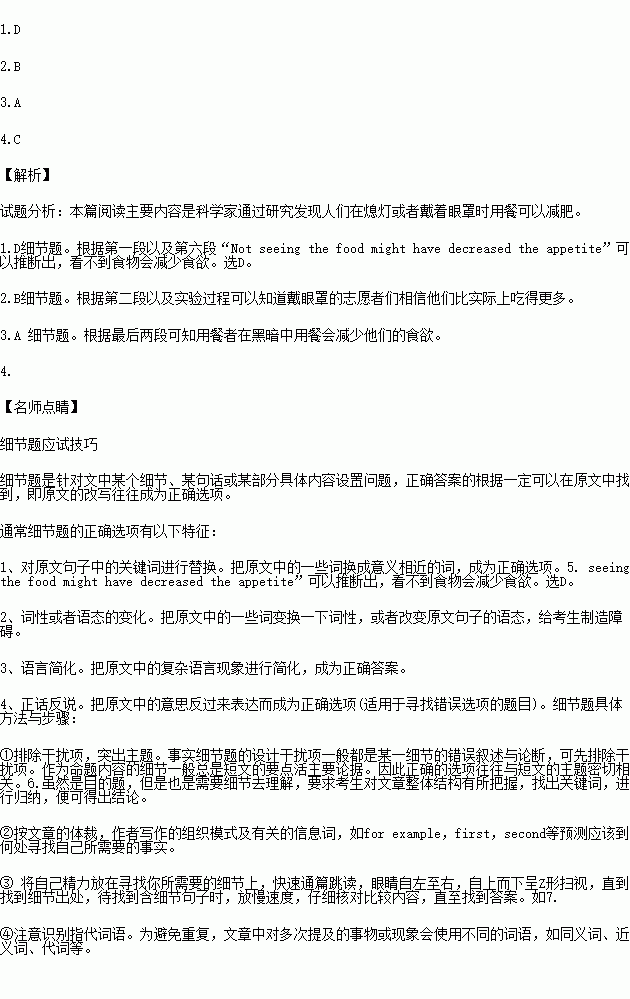题目内容
Turning the lights out or wearing a blindfold while eating could be a quick way to lose weight, according to scientists. The simple trick works because it stops diners eating for pleasure rather than for calories. It also triggers (引发) a part of the brain that is worried that unseen food may go bad.
An experiment by the University of Konstanz, in Germany, found that people who were blindfolded consumed nine percent fewer calories before they felt full, compared to those who could see. They also vastly overestimated how much they had eaten because they could not see how much was left on the plate. Blindfolded volunteers estimated(估计) they had eaten 88 percent more than they actually had.
Scientists believe that not seeing food on the table also allows the body to know when it is full in real time rather than remembering past experiences where it might have taken a full plate to feel full.
In the experiment, 50 people were blindfolded and 40 were allowed to see their food. All were told not to eat within two hours of the experiment. They were then given three 95g bowls of chocolate ice cream and invited to eat for 15 minutes. Their bowls were taken away and the remaining ice-cream weighed, while the participants were quizzed on how much they thought they had eaten.
On average the group who could see ate 116g while the blindfolded groups ate 105g. However, the blindfolded group believed they had eaten 197g while compared with 159g for the non-blind volunteers. They were also asked how pleasant the ice-cream tasted and the blindfolded group rated lower than those who could see.
“The experienced pleasure of eating was significantly lower in the blindfolded group. Not seeing the food might have decreased the appetite. Sight plays an important role in the eating experience and in the overall dining experience.”
Previous studies have shown that the visual influence of food plays a large part in the taste. While restaurants that allow diners to eat in the dark state that it triggers other senses, in fact eating in darkness is likely to taste far milder than usual.
1.With the lights out, diners eat less partly because ______.
A. they want to quickly finish their meals
B. they trust their feelings more than ever
C. they focus more on fun than the calories
D. they worry about the quality of the food
2.We can learn from the passage that the blindfolded group ______.
A. spent a much longer time eating the same food
B. believed they ate more than they really did
C. depended on past experiences to feel full
D. thought the food tasted better than usual
3. The last two paragraphs tell us that ______.
A. diners are likely to lose their appetite eating in darkness
B. senses rather than sight play an important role in the taste
C. findings of this experiment differ from the previous studies
D. restaurants benefit a lot from allowing diners to eat in the dark
4.The main purpose of the passage is to ______.
A. provide statistics related to eating in the dark
B. offer reasons for people to eat in the dark areas
C. inform the readers of the result of an experiment
D. persuade the readers to lose weight in a new way
 阅读快车系列答案
阅读快车系列答案
